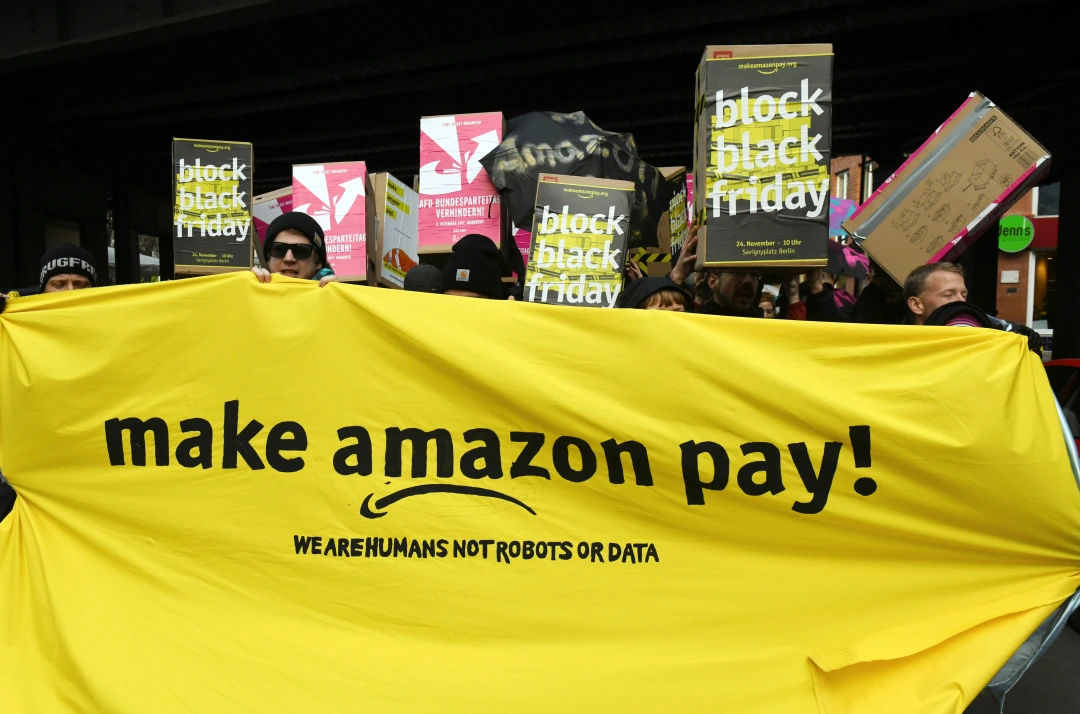
New York, November 26 (RHC)-- Amazon employees and their supporters have rallied in dozens of countries to protest against the retail giant’s labour policies, according to campaigners. From Germany and France to the United States, from India to Japan and the United Kingdom, Amazon’s employees downed their tools or joined marches on Friday demanding better working conditions and fair wages.
The actions coincided with one of the busiest shopping days of the year, Black Friday, when significant discounts push sales, leading to additional stress on retail and warehouse workers. The Make Amazon Pay coalition, which made the call for the strikes, said industrial action and protests took place in more than 30 countries.
In Germany, there were demonstrations at nine out of Amazon’s 20 warehouses in the country, although on Friday morning, the company said the vast majority of its employees in the country were working as normal.
The Verdi union, which called the strikes in Germany, demanded the company recognise collective bargaining agreements for the retail and mail-order trade sector.
It also called for a further collective agreement on workers’ wellbeing, with one spokesperson noting that warehouse employees can walk 15-20 kilometres (9.3-12.4 miles) per day on the job.
A spokesperson for Amazon in Germany said the company “offers great pay, benefits and development opportunities – all in an attractive working environment”. Among other things, the spokesperson pointed to a wage increase for Germany’s Amazon logistics employees from September, with the starting wage now at 13 euros per hour or more, including bonus payments.
But with inflation at its highest rate in decades at more than 10 percent in Germany, a Verdi spokesperson in Koblenz called the recent wage increase “a drop in the bucket.” ”With the small amount of money or salary that you earn, you can’t live in this time,” said Bastian Zafi, an Amazon worker in Germany. “I have three children and we both work and we have a huge problem. Because the costs have risen so enormously that you can’t live with what you earn.”
In France, where union groups SUD and CGT called for strike action in the country’s eight warehouses, campaigners said 60 people were demonstrating in front of Amazon’s Bretigny-sur-Orge site near Paris on Friday morning, with another 50 staying at home, out of a total 5,000 full-time and temporary employees at that location. Amazon France said there had been no sign of disruption to operations so far.
SUD was asking for a Black Friday bonus of 1,000 euros, which is double the payment offered by Amazon, as well as a 150 euro bonus per weekend worked in the fourth quarter.
In the United States, workers at an Amazon facility in St Peters, Missouri walked off their jobs, while unions representing retail workers in New York City staged demonstrations outside Amazon owner Jeff Bezos’s apartment building.
Protests and rallies also took place in several other countries and territories including Argentina, Ireland, South Africa, Palestine, Bangladesh and Australia.
Stuart Appelbaum, the president of the Retail, Wholesale and Department Store Union in the US, said Amazon is denying workers their humanity.
“Amazon workers, all over the world, no matter which country they live and work, are experiencing the same dehumanising mistreatment from Amazon. The conditions are so bad working for Amazon that there is a turnover rate of 150 percent a year,” he told Al Jazeera. “The cost of living increase just makes it worse,” he said.
“Amazon’s business model is to treat people like robots. They are managed by an algorithm, they are fired by text messages on their phone, people are afraid to go to the bathroom because they might lose their jobs if they fail to meet their productivity quota.”
Amazon, which has a global workforce of more than 1.5 million, most of whom are hourly workers, has refused to recognise trade unions. It previously defended its labour policies, saying the company offers “competitive pay” and “comprehensive benefits.”

